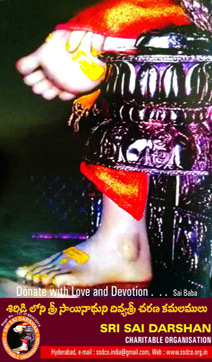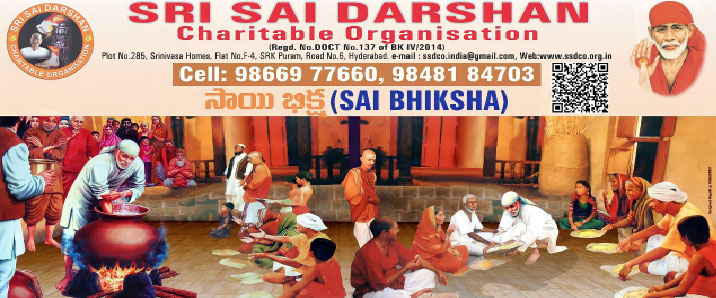
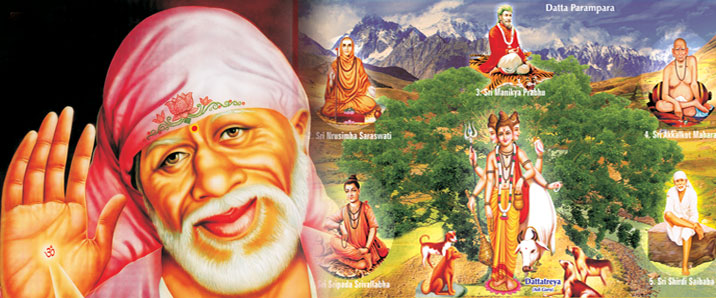










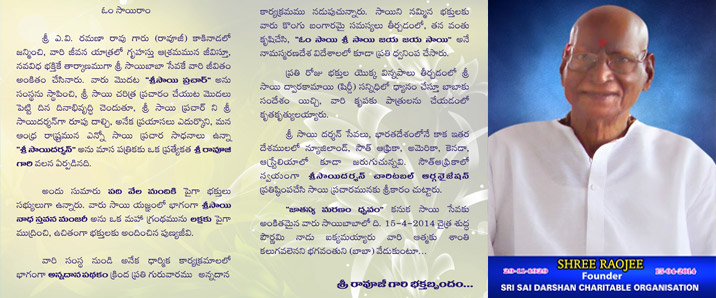
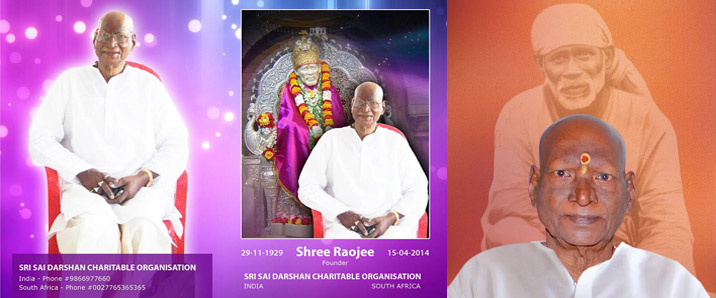

Sai Baba of Shirdi (unknown circa 1835 - October 15, 1918), also known as Shirdi Sai Baba, was an Indian guru, yogi and fakir who is regarded by his Hindu and Muslim followers as a saint. Sai Baba was relatively unknown till 70s. His popularity gone up in 90s. Some of his Hindu devotees believe that he was an incarnation of Shiva or Dattatreya although idea of incarnation is very recent. There are many stories being told about miracles he performed. According to some locals from Shirdi village, he was a social worker than a person having miraculous power.
The name Sai Baba is a combination of Persian and Indian origin; Sai is the Persian term for "holy one" or "saint", usually attributed to Islamic ascetics, whereas Baba is a word meaning "father" used in Indian languages. The appellative thus refers to Sai Baba as being a "holy father" or "saintly father". His parentage, birth details, and life before the age of sixteen are obscure, which has led to a variety of speculations and theories attempting to explain Sai Baba origins. In his life and teachings he tried to reconcile Hinduism and Islam: Sai Baba lived in a mosque, was buried in a Hindu temple, practised Hindu and Muslim rituals, and taught using words and figures that drew from both traditions. One of his well known epigrams says of God: "Sabka Malik Ek" ("One God governs all") which traces its root to Islam. Sai Baba taught a moral code of love, forgiveness, helping others, charity, contentment, inner peace, devotion to God and guru. saints.
The birth and the early life of Shri Saibaba are not much known. From the year 1858, Baba lived in the village of Shirdi in the state of Maharashtra for over sixty years. Baba came to Shirdi in 1858 accompanying a wedding procession as guest of honor. He was greeted my Mahalsapathi "Ya - Sai"(Welcome Sai). Baba accepted that name to be eternally his and spent his early days at Shirdi, under a neem tree and later lived in the masjid which he named as Dwarkamai or Mother Dwarka (Dwarka is the holy city associated with Lord Krishna).......
Chand Patil was once riding through the forest when suddenly he felt an acute urge to smoke. To his great dismay, however, he found that he did not have the wherewithal to ignite a fire to light his chelum with. Seeing Sai Baba seated under a tree, the rider approached him for a match. Baba had no matches, but just by thrusting the tongs nearly, he produced flames. The rider witnessing the miracle, realizes Baba's divine stature and kneels to him in devotion ......
Here is an instance of a devotee's burning love for the master. Baijabai daily sought out Baba in the forest where he lived in the early days, in order to bring him food, which she lovingly prepared for him. Baba raises his hand in a gesture of blessing......
Service is the badge of God's kingdom. Radha Krishna Mai voluntarily assumed the duty of sweeping the ashram compound daily. This was her way of showing her adoration for the Master......
Saibaba was the common man's God. He lived with them; he slept and ate with them. He had no pretensions of any kind. Baba used to feed the fakirs and devotees and even cook for them. The food that Baba made seemed to grow in abundance and there was always enough for everyone. The touch of a Sat-Purusha unlocks the storehouse of the Goddess Annapoorna's unlimited resources.....
Saibaba was very fond of children. He used to spend part of his day in playing, chit-chatting or humoring with the children of the village.....
Saibaba used to sit on the steps of the Dwarkamayee at Shirdi, absorbed in the divine bliss of music. Saibaba's appreciation of talent, and the warm encouragement He gave to those who had talent were priceless gifts from the Master.......
Saibaba in the company of devotees and fakirs used to dance and sing in divine bliss, with small tinklets tied around his ankles. Songs he song were mostly in Persian or Arabic or sometimes some popular songs of Kabir.......
Saibaba had a profound love and compassion for suffering humanity. The master used to personally attend to the needs of the sick as a physician and a nurse.......
Saibaba's knowledge of the Shastras, the Geeta, the Quran and other scriptures was phenomenal. Without studying or reading books, Baba possessed a rare proficiency in all the scriptures, and he could quote a verse or a line from these books and scriptures to show where a particular truth lay embedded........
Saibaba distributed the holy 'Udi' - the panacea for all troubles - to his bhaktas. 'Udi' is the ash from the perpetual sacred fire - Dhuni - lit by Baba a hundred years ago. The Udi is the token of his divine grace to all who come to him for help......
Saibaba ploughed up the village common land and raised a flower garden thereon; he watered the plants, carrying pots full of water on his shoulders. In the later years he spent a few hours in this Lendi garden, which he himself had laid out in the early days.......
He begged for alms and shared what he got with his devotees and all the creatures around him. He never kept any food in reserve for the next meal. At times Baba would scold a grudging housewife by saying- "Mother, you have so many chapaties, so much rice and this or that vegetable in your pots, why refuse a bit of food to a Fakir?". The gentle prodding and the accuracy of the strange fakir's pronouncements would remove the veil of maya from these women who would then rush to put all with them at his feet, as an offering of Love.......
Laxmibai Shinde used to offer Saibaba bread and milk every day with love and devotion. Baba accepted and took the offering she made. She was so special to Saibaba that just before his passing away, Saibaba gave her Rs.5/- and Rs.4/- in all Rs.9/-. The figure 9 is special and is indicative of the nine types of devotion viz., (1) Shravana (Hearing); (2) Kirtana (Praying); (3) Smarana (Remembering); (4) Padasevana (resorting to the feet); (5) Archana (Worship); (6) Namaskara (Bowing); (7) Dasya (Service); (8) Sakhyatva (Friendship); (9) Atmanivedana (surrender of the self).
The 15th October 1918 was a sorrowful day for the little village of Shirdi, for in the heavy hours of the noon, the beloved master suddenly breathed his last. Quietly and unobrusively, Baba gave up his body and let his head fall gently on the shoulders of a near disciple. Though Saibaba might have left his mortal coil, he still is alive for his devotees. He is a Living God. Even today, though he has left his gross body, we feel his presence and obtain his grace and protection every day.......
The villagers of Shirdi and afar soon found out that this was no ordinary fakir but an avatar (incarnation) of a very high order. He demonstrated through his miracles and utterances, the purpose and intention for which he had come. He would often say, "My Leela is inscrutable". To each one he met, he imparted knowledge according to the capacity of the recipient to absorb it. Baba's Leela's (miracles) were plenty and varied, and we recount just a few which occurred during and after his lifetime.
Lighting lamps with waterLong before Sai Baba's fame spread, he was fond of burning lights in his Masjid and other Temples. But for the oil needed in those little earthenware lights that he lit, he depended on the generosity of the grocers of Shirdi. He had made it a rule to light earthenware lamps in the masjid every evening and he would call on the grocers for small donations. But there came a time when the grocers got tired of giving oil free to Sai Baba and one day they bluntly refused to oblige him, saying they had no fresh stocks. Without a word of protest Sai Baba returned to the masjid. Into those earthenware lamps he poured water and lighted the wicks. The lamps continued to burn deep into the midnight. The matter came to the notice of the grocers who now came to Sai Baba with profuse apologies. Wouldn't Sai Baba kindly pardon them? Sai Baba pardoned them, but he warned them never to lie again. "You could have refused to give me the oil, but did you have to say that you didn't have fresh stocks?" he admonished them. But he had made his point.
Premonition of burning fieldsOnce, harvesting in Shirdi had been completed and the foodgrains of the entire village had been stored in a yard. The summer was on. The heat was intense as only those who have lived in Shirdi know. One afternoon Sai Baba summoned Kondaji Sutar and said to him: "Go, your field is on flrel" Frightened, Kondaji ran to his field and. frantically looked around for any sign of fire. There wasn't any. He returned to the masjid and informed Sai Baba that he had looked everywhere but had found no trace of fire and why did Baba have to frighten him? Unfazed, Baba said : "You better turn back and look again." Baba was right after all. Kondaji noticed that a sheaf of corn was indeed on fire and smoke was billowing from it. A strong wind was fanning the fire and word had gone round to the villagers who now came running to the scene. "Sai Baba," the people shouted "help us, help us put the fire out!" Thereupon, Sai Baba walked casually towards the yard, sprinkled some water on a stack of sheaves and said: " There now! The fire will die down!" And so it happened.
Stopping the rainThere is the story of one Rao Bahadur Moreshwar Fradhan who had come to Shirdi to take Sai Baba's darshan along with his wife. As the couple were about to leave, it began to rain heavily. Thunder and lightning rent the air. As the Pradhan couple looked round in dismay, Sai Baba prayed. "Oh Allah!" he intoned, "let the rains cease. My children are going home. Let them go peacefully!" The storm thereupon ceased, the downpour reduced to slight drizzle and the Pradhans were able to reach their destination safely.
Raising the water level in WellWhen Sai Baba first came to Shirdi it had of no basic facilities. There was a well put only in name. It had no natural spring water and if ever there had been one, it must long ago have dried up. Water had to be fetched from a distance. When, therefore, Sai Baba gave his permission to the villagers to celebrate the Ram Navami Fair, (Baba's Birthday) the big problem facing the organizers was one of water supply. So What should they do but go to Sai Baba with their problem? "'Oh yes," said Sai Baba, 'so you want plenty of water, do you? Here, take this and drop it in the well and wait and see." "'This," turned up to be a platter of flowers on which some prasad (blessed food) had been placed along with the remnants of alms Baba had received earlier in the day. The villagers had no qualms about doing as they were did. Their faith in Sai Baba was total. No sooner had that platter of leaves been dropped in the well, it is said, water rose from the bottom as if by divine command and completely filled it. And great was the rejoicing of the people.
Saving a child from drowningOne report has it that word had spread that the 3-year old daughter of a poor man called Babu Kirwandikar had fallen into the well and had been drowned. When the villagers rushed to the well they saw the child suspended in mid-air as if some invisible hand was holding her up! She was quickly pulled out. Sai Baba was fond of that child who was often heard to say : I am Baba's sister!" After this incident, the villagers took her at her word. "it is all Baba's Leela", the people would say philosophically. They could offer no other explanation.
Flow of Godavari (river) from Baba's feetThese were instances of things they had seen with their own eyes. It was not secondhand information they had gathered. Sai Baba was to them as real as their homes and their fields and their cattle and the distant hills.Das Ganu once had an unforgettable experience. On a festive occasion, he sought Baba's permission to go to a place called Singba on the banks of the Godavari to have a bath in the holy waters. "No," Baba replied resolutely, "where is the need to go all the way when the Godavari is here right at my feet?" Das Ganu was vexed. He was willing to concede that Ganga the holy river (Baba frequently referred to Godavari as Ganga) rose from the feet of Sri Narayana (one among the Hindu trinity of Gods) himself, but his faith was not deep enough to believe that the waters of the Godavari could spring form the feet of his master, Sri Sai. Baba who was reading Das Ganu's mind decided that this was the time to strengthen Das Ganu's faith. He told his devotee: "come closer to me and hold the hollow of your palms at my feet!". As soon as he did so water flowed freely out of the toes of the master's feet and filled the hollow of Das Ganu's palms in no time. His joy knew no limits. He sprinkled the water on his head and his body and distributed some more among the assembled devotees as tirtha (holy water).
Other MiraclesThere was that other occasion when many thought that the masjid which housed Sai Baba itself would be consumed by fire from the flames which leapt up from the dhuni. All that Baba did was to take some swipes at a wooden pillar in front of him. With every blow the flames subsided and the fire died down. "Miraculous," said his devotees. Often they would notice him stirring some hot concotion over the kitchen fire, not with a ladle but with his bare hands. There never was a time when his hand was scalded. What supernatural powers did he have? On yet another occasion, Sai Baba was partaking of food with three of his devotees in the masjid when, without any cause for provocation, he exclaimed- "Stop!" Then, as if nothing had happened, the four continued with their meal. Lunch over and the dishes cleared, they stepped out of the masjid, when large chunks of the ceiling fell on the very spot where they had been seated only a few minutes earlier. Did Sai Baba's powers extend even to inanimate matter, the devotees wondered. Instances have been quoted by his devotees as to how Sai Baba commanded the rains to stop and the winds to cease.
Understanding Sai BabaBaba always maintained the "Dhuni" or the perpetual fire. The realisation that all the phenomenons of the nature are perishable and unworthy of our craving, is signified by "Udi" which Sal Baba distributed to all. Baba never left Shirdi. He talked to people who came to see Him. Sal Baba would often speak in symbols and parables leaving his devotees to work out the answer - such as, "A man had a beautiful horse, but no matter what he did, it would not run in harness. An expert suggested that it should be taken back to the place from where it had come. This was done and it become tracable and useful". The explanation of this story is that the horse is the Ego. As commander of the physical and mental powers of man, it is useful but self-willed and therefore cause endless trouble. Taking it back to its source is re-absorbing it in the spirit source which it arises. It is the return to the source which purifies and enlightens. From there the ego issues forth again, no longer an ego, but a conscious agent of the spirit. Baba would ask for Dakshina (money offered with respect to the Guru) from some of those who came to see Him. This was not because he needed their money. This was one of Baba's methods for testing out the devotee's attachment to worldly things and willingness to surrender his ego. Once one has surrendered himself totally to Him, Baba takes care of all His spiritual and temporal needs. Baba regarded money like everything else, in a symbolical manner. He once said, " I ask only from those who the fakir (God) points out and in exchange I give them ten times as much". By the end of the day, all the money Baba had earned was distributed to the destitute, poor, sick and the needy. Baba used to feed the fakirs and devotees and even cook for them. For those who were accustomed to meat, he cooked meat and for the others vegetarian fare..
The Dwarakamayee of Sai Baba was open to all, irrespective of caste, creed or religion. Among those who came to see him and got his darshan (establishing spiritual contact with the Guru) and blessings were ministers, government officials, business people and village folk. He was the common man's God. He Stayed with them, hejoked with them, He slept and ate with them, he smoked a chillum (pipe) with them, he sang and danced with them, having no pretensions of a God. But all of them Knew that He protected them. Even today, though He has left his gross body, they feel his presence and realise his worth all the more. Baba would also refer to the sounding of the drum of the beginning of eternity within the soul. This "anahat" sound emerged from Baba's heart from every limb, every bone and pore of his body. It was permeated with divine essence and Baba claimed that though one day his physical body will not exist, his remains will communicate with from the grave. Therefore, the most important place in Shirdi is Baba's temple - the Samadhi Mandir is his grave, which literally millions have visited and still continues to draw many more.



